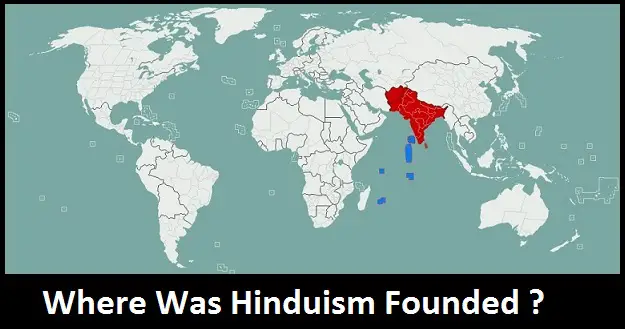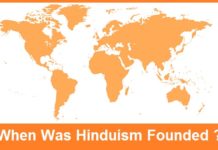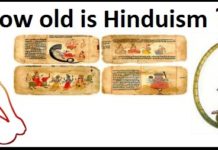Know Where was Hinduism Founded ?
The Term ‘Hinduism’ denotes a wide range of related Hindu denominations which belongs to the Indian subcontinent. Though Hinduism does not have any specific origin or particular time of its foundation, it is considered to be the oldest religion of the world, still maintaining its rituals and traditions over the decades. Its history over lapsed with the Indian development since the Iron Age in India. Basically, when the question comes about where was Hinduism founded, its origin is considered to be India. The Indus Valley Civilization was the starting point of Hinduism and then it was spread away to the rest of the Indians who acquired Hinduism as their religion.
It is told that initially Hinduism was not founded as religion, but it was based on people’s common practice and rituals. The Epic and Puranic period experienced the ‘Golden Age’ of Hinduism. The oldest living religion, Hinduism was developed from the concept of Brahmanism. This ‘Sanatana Dharma’ made the people to live together and to be united for the sake of the religion. They were hugely supported by Hinduism at that period of time and found it to be the savior of them. It is actually a fusion of Several Indian cultures and traditions.
Related Article : Hinduism Origin
The term ‘Hinduism’ is derived from the Persian word Sindhu or Indus which belonged to the North-West side of India. The gradual rise of Hinduism was because of the combination of Harappan and Indo-Aryan civilizations. However, it is extremely difficult to say about where was Hinduism founded and when. It is a timeless religion, still existing as a well-established one. The south-Asian culture was mixed up with the concept of Hinduism and gave it a shape which anyone could acquire for his own practice of life.
Hinduism is almost 4,000 years old but it has not stopped being evolved and developed till now. In spite of being unanswered about where was Hinduism founded, it is known as the oldest living religion which is also spread to the other parts of world and the Indians have well-established them in every aspects. The Indus Valley Civilization was beside the Indus River, and therefore they were called ‘Indus’. The mispronunciation of the word made it ‘Hindus’ and the religion became Hinduism. The residents of this civilization were called Hindus irrespective of their religion and culture and it became their identity. The rituals and traditions they practiced became a part of Hinduism.
Related Article : Founder of Hinduism
When it comes to the topic of Hindu faith, this is not based on going to temples every day or praying to Gods for long hours. It is always based on the superiority of Gods who is always there to help the needy people who are suffering. The common practice like animal sacrifice was also started by Hindus to show gratitude to Gods. Unlike the other religions, it has no founder, no specific origin or time period, it has always explained a theological system and a definite moral code. Sometimes, Hinduism is described as the ‘most tolerant’ of all other belief systems.
Hinduism is known as a polytheistic religion as it believes more than one God and it does not claim about a secured harmonious afterlife. The Aryans also practiced the religion which is sacrifice-based and had its centre around trans-formative and purifying qualities of fire which was oriented toward influencing vast array of Hindu Gods who were known as ‘Devas’. The ‘Devas’ were actually personified by the natural elements like sun, water, fire, wind and many warrior-like figures.
Related Article : How Old Is Hinduism ?
The question ‘Where was Hinduism founded’ is definitely a topic of many debates. The scholars who are still in the research works make different comments about it. As there was no correct information about where was Hinduism founded, people started finding its origin from the very beginning of it but unable to reach a particular point of view. The religion is open to interpretation, collection of paths of wisdom which is mostly based on human reasoning and less on any divine figure. The oldest written scripture of Hinduism, the Vedas, were also unable to give the right origin of Hinduism but they gave an idea of the gradual development of Hinduism. Hinduism was then manifested with new kinds of philosophies and changed quite with time. It is considered as the spiritual development with relation to God. The term ‘Hindu’ is also a very controversial word and could not be found in any old Indian scriptures or Vedas. Even the term ‘Hindustan’ also did not come from any Indian. The Muslim invaders who came to India described India as ‘Hindustan’ by seeing the population of Hinduism-practiced in India.
Hinduism was initially recognized as ‘Dharma’ by the scholars. This Dharma consists of developing human mind, culture for stability of society. The concept of many Gods in Hinduism is also defined very well by Hindus. They explain that as a diamond has many facets, the Hindu Gods also represent the different facets of Hinduism. A believer of any particular facet of Hinduism does not deny the existence of others. Hindus commonly conduct pujas in three different environments: temples, homes and outdoor public spaces.
Offerings are the main part of Hindu worship. The process of receiving and giving is also an important aspect of Hindu worshiping. The deity worship was also developed after many years of the foundation of Hinduism. Indus Valley Civilization, the probable answer of’ where was Hinduism founded’ was not habituated with the concept of deity worshiping and they preferred animal sacrifice and other sacrifices to worship Gods. The Brahmanism of Dharmashastras went under a radical change in the hands of Puranic composers. They basically changed the view and concept about Brahmanism. The Hinduism based on Purana is actually a multiplex-belief system which has been always expanded and developed by the involvement of other cultures and traditions. Therefore, where was Hinduism founded is actually being answered by the longevity of Hinduism which has made its own individual place worldwide.




